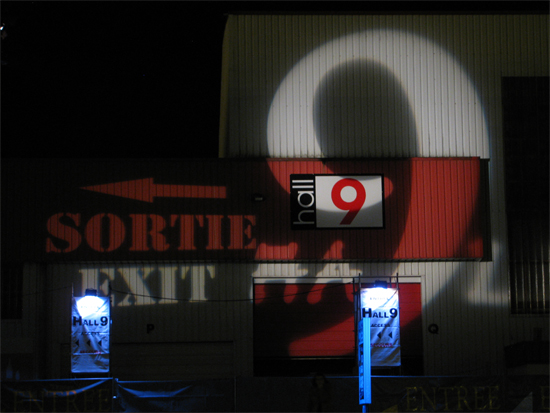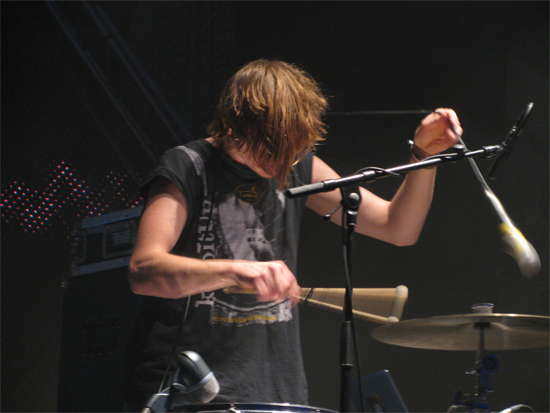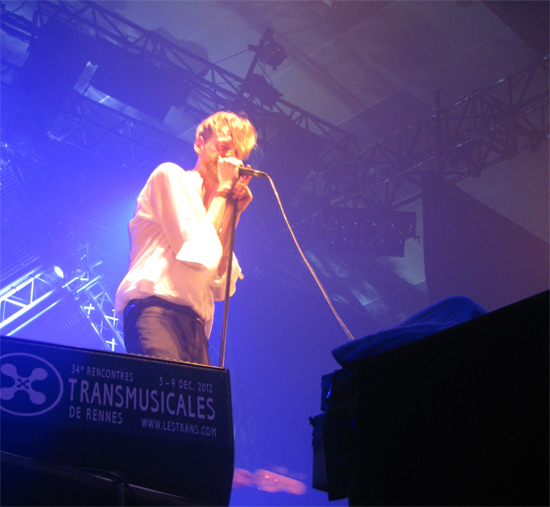The Transmusicales de Rennes festival began at the tail end of the 70s as a kind of ‘fuck you’ to the music industry and stars of Paris. Emerging from an artistic association known as Terrapin after the Syd Barrett song and fired up by punk, it said "hey, things are happening over here too – but you’re going to have to come here to find out what." Over 30 years later, people are still coming, except now it’s not just to check out the local musicians in a scene that cradled Marquis de Sade and Etienne Daho (although locals groups do play the festival). Quite what it stands for now, though, is harder to make out, still guided as it is by indefatigable director Jean-Luis Brossard’s wayward tastes but buffered by commercial pressures.
Within the same bill you’ve got godawful, bargain-bin indie from China Rats, a deadmau5-y wunderkind in the shape of Madeon and a three act audio-visual work at the Rennes opera house taking in classical, rock opera, techno and rap. A rumour (possibly started by Brossard himself) goes around that Eric Cantona will be appearing on stage with Algerian star Rachid Taha singing ‘It’s Now Or Never’, but afterwards it’s difficult to get a consensus on whether the great philosopher actually made an appearance – in rather Christic fashion, there are some who are adamant they saw him and others who say it was just someone who looked like him. One of the things that seems to distinguish Les Trans, as Luke Turner picked up on last year, is not so much the acts that play but the spirit in which the Rennais and festival-goers seem to take the event.
While I was in Rennes this year, it was reported in local paper Ouest France that the fest-noz, a Breton night-time dancing-and-carousing party, has been recognised by Unesco as being part of the ‘intangible cultural heritage of humanity’. This symbolic victory is part of a drive by Brittany to get its own version of Irish ‘craic’, and all the wealth and marketing potential that comes with St Patrick’s Day, up and running. The worst-case vision of this is that Brittany is en route to Michel Houellebecq’s vision in the ‘The Map and the Territory’ of theme-park France, with each region a simulacrum selling the ‘authenticity’ of its own culture, its terroir – indeed, the term fest-noz is 20th century term for an activity that was deliberately revived last century (avant-retromania) but which supposedly has its roots in the tramping down of earth to create the foundations for a house. What can’t be denied, though, is the genuine inebriated enthusiasm that gradually gathers pace from Wednesday until the weekend where it really hits a whole new gear and the whole town is pretty much wrapped up in it, whether it likes it or not.
For several years, the festival had been held almost exclusively in the aircraft hangars of the Parc Expo outside the town – and one of the weird pleasures of the event is squeezing onto a packed shuttle bus filled with drunk and delirious, though largely good-natured, French teenagers, many of them chanting or singing slurrily in chorus. The revelation that you are English will invariably lead to at least one intense and quite often surreal conversation on the bus back, and one kid this year wanted to tell me at length about his dream of being a stand-up comedian. Not that the desire to party can’t get out of hand – my first visit to Rennes in 2005 coincided with my first taste of tear-gas when a planned free rave was cancelled, disgruntled teens started setting fire to bins and the riot police were called in.
Recently, some of the concerts have been brought back into town, to the Le Liberté, which can house 5,900 people in its main hall plus 600 in the tunnel-like Étage upstairs, and several other venues in the vicinity. Then, alongside all this main festival hoopla, there’s Les Bars en Trans, which is Les Transmusicales’ younger, scruffier sibling. It has also furnished me with some of my favourite musical memories of Rennes over the years, partly because of the intimacy of the venues (bars, largely, clustered around the Place St.Anne in the more medieval upper reaches of the town) and because of the unexpected delights that you can literally stumble upon, both musical and culinary – although I’ve been expressly forbidden from mentioning a certain local speciality as it has apparently become a cliché of reviews of Les Trans.
The metal crates of the Parc Expo are a mixed blessing. Some people you expect to work well in a warehouse rave-y environment just get lost (as Luke reported of Factory Floor last year) and others you know are doomed from the start, as Janelle Monáe was two years ago. Then again, others you think might be too lacking in muscle, like Melody’s Echo Chamber on Saturday night, manage to pour some warmth and fuzzy light into these forbidding chambers. The ideal act for the huge, 7,000-capacity Hall 9, though, turns out to be Hudson Mohawke-Lunice collaboration TNGHT. I can’t say I’ve had much time for HudMo in the past but TNGHT are monumental, the sheer stripped-back weight and quality of the sound looming over everything else at the festival. As well as the bass, naturally, it brings out the strange, papery feebleness of trap snare-rolls, the sense of so much being held back momentarily just adding to the menace. Directly after that, Hot Panda in Hall 3 initially seem way too slight but gradually turn out to be the best jagged indie pleasure of Les Trans, not least because, following a story from singer Chris Connelly about how he learned his first bass line while on a French exchange trip, they rip into Nirvana’s ‘Breed’. Then they do ‘Territorial Pissings’ as well for good measure. And they’re both great. ‘Hot Panda play Nevermind’ doesn’t seem a bad proposition.

The other band that really thrives in these environs are Berlin’s Camera, who have gained some notoriety for playing gigs in their city’s metro. They’re about as pure a vision of motorik rock as its possible to produce without effacing your personality completely, and the results are compelling.
As for Vitalic, everyone says they don’t want to hear Vitalic anymore until Vitalic comes on and then they remember that occasionally he’s at least on speaking terms with euphoria.
One theme running through the festival is just how much cold-to-lukewarm synth-wave, synth pop, generally-that-end-of-the-80s-influenced stuff there is, particularly from French folk. The aforementioned Etienne Daho clearly holds some sway when it comes to the brighter tunes from Pegase and O Safari, while Darko and the execrable Astrodynamics (featuring worse Ian Curtis impressions that you’ve ever heard from Paul Banks, and that takes some doing) hold up the gloomier end. What they have in common is that they are all, in an odd sense, almost entirely unmusical, focused so hard on channelling the aura of an era that, for all the extra beef provided by up-to-date kit, they neglect to actually write anything of note and the songs arrive stillborn. The same even goes for Team Ghost to a degree, even though they have a more panoramic sweep. Sweden’s synthi-industralists Agent Side Grinder slip this trap, because any band with that frontman (and who looks and dances that much like my housemate) can’t fail to be memorable, because they aren’t afraid to be magnificently ridiculous but also, paradoxically, by sticking closer to their sources in all their ungainly glory. They look like they breathe this stuff – if synth-pop revival is like folk revival, everyone else is Mumford & Sons and Laura Marling and Agent Side Grinder are mental.
Speaking of Etienne Daho, who I have plenty of time for, he’s also responsible for giving Lou Doillon, (Jane Birkin’s daughter, Charlotte Gainsbourg’s half sister; French royalty basically) a musical platform, taking her under his wing and producing her album. The music’s as unremarkable as you’d expect, and her set even starts with a song fitting the exact description of the kind of chanson pop I decried in my review of Les Francofolies de La Rochelle last year, particularly the "staccato, Penny Lane rhythm."

Things aren’t always much better with French bands at the rockier end of things. The Octopus prompt more than one member of the visiting English party to mouth "Kula Shaker"; Crane Angels were fêted by many last year when they played in Les Bars, and they do have a freewheeling energy but the Rugrats-form-a-band vibe is grating. Still, they at least feel like living, breathing band and, more positively, We Are Van Peebles deal in a potent brand of Mclusky-ish hardcore that their recordings don’t really do justice to, The 1969 Club do great rock n’ roll theatre if nothing else and Lolito’s new wave pop is psychotically saccharine.
Still, it’s that show at l’opéra de Rennes that sums up the festival experience. It’s a huge work by renaissance man and guitarist for hire Olivier Mellano called How We Tried A New Combination of Notes To Show The Invisible Or Even The Embrace of Eternity. The first act is the orchestral part featuring an imperious female soprano, Valérie Gaball, and a film projection focusing on sea, sand and dancing. In the second act the music is recreated in a rock-operatic mode by an orchestra of guitars and a drummer, with Simon Huw-Jones on vocals. Finally it’s the ‘electro hip hop version’ with rappers MC Dälek, Black Sifichi and Arm from Psykick Lyrikah. And there are dancers and a poetry reading to boot. Thematically, the whole thing seems to be equating musical creation with the creation of the world and the creation of self, the phrase "where is this music going" repeats, mathematics also becomes an issue, first creating seeming order then dissolving into chaos. I know my hip-hop better than I know my classical so in the section where the former dominates I’m probably more critical, more alert – does this stand up as hip hop? Sometimes no, too dry, academic, then the next moment it’s morphed into Cannibal Ox. It’s difficult to know who could take it all in and give every part its due but in its sprawling, almost unnavigable ambition, as with that of Les Transmusicales in general, I salute it.


